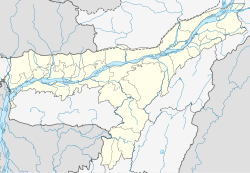Sonkuriha, 'Suvarnakundya' in ancient times,[1] is a village in Nalbari district of Western Assam.
Sonkuriha
Suvarnakundya | |
|---|---|
village | |
| Coordinates: 26°23′N 91°27′E / 26.39°N 91.45°E | |
| Country | |
| State | Assam |
| Region | Western Assam |
| District | Nalbari |
| Government | |
| • Body | Gram panchayat |
| Elevation | 42 m (138 ft) |
| Languages | |
| Time zone | UTC+5:30 (IST) |
| Telephone code | 03624 |
| Vehicle registration | AS-14-XXXX |
| Website | nalbari |
Etymology
editThe modern name is derived from Sanskrit form 'Suvarnakundya'[citation needed], the ancient name of the area.
History
editThe arthashastra of Kautilya mentioned flourishing trade with Kamrup. He mentioned finest sik of his times was produced in Sonkuriha (Suvarnakundya).[2][3] It also produced a special perfume named 'Tailaparnika', which also produced in at least six other places within Kamrup region. The Kamrup also produced Chandana and Aguru products at that time.
Like rest of Kamrup region, language used in Sonkuriha is Assamese language.
Festivals
editDomahi, Amati, Durga Puja, Kali Puja (Shyama Puja, Diwali), Holi, Janmastami, Shivratri etc. are major festivals of the village. Vedic culture is widespread in day-to-day life.
Transport
editThe village is well connected to
See also
editReferences
edit- ^ (Ghoble 2000:14) Suvarnakudya has been correctly identified with Sonkuriha in undivided kamrup, nine miles from Hajo which remained an important mart for Indo-tibetan and Bhutan trade till recent times
- ^ Kiran Singh (1994), Textiles in ancient India: from Indus Valley Civilization to Maurya period, p.36
- ^ Anjan Kumar Bhattacharyya (1988), Modern Accounting Concepts in Kautilya's Arthaśāstra, p.134
Bibliography
edit- Ghoble, T. R. (2000). India, China, and South-East Asia: Dynamics of Development. Deep & Deep Publications. ISBN 978-81-7629-204-7.

